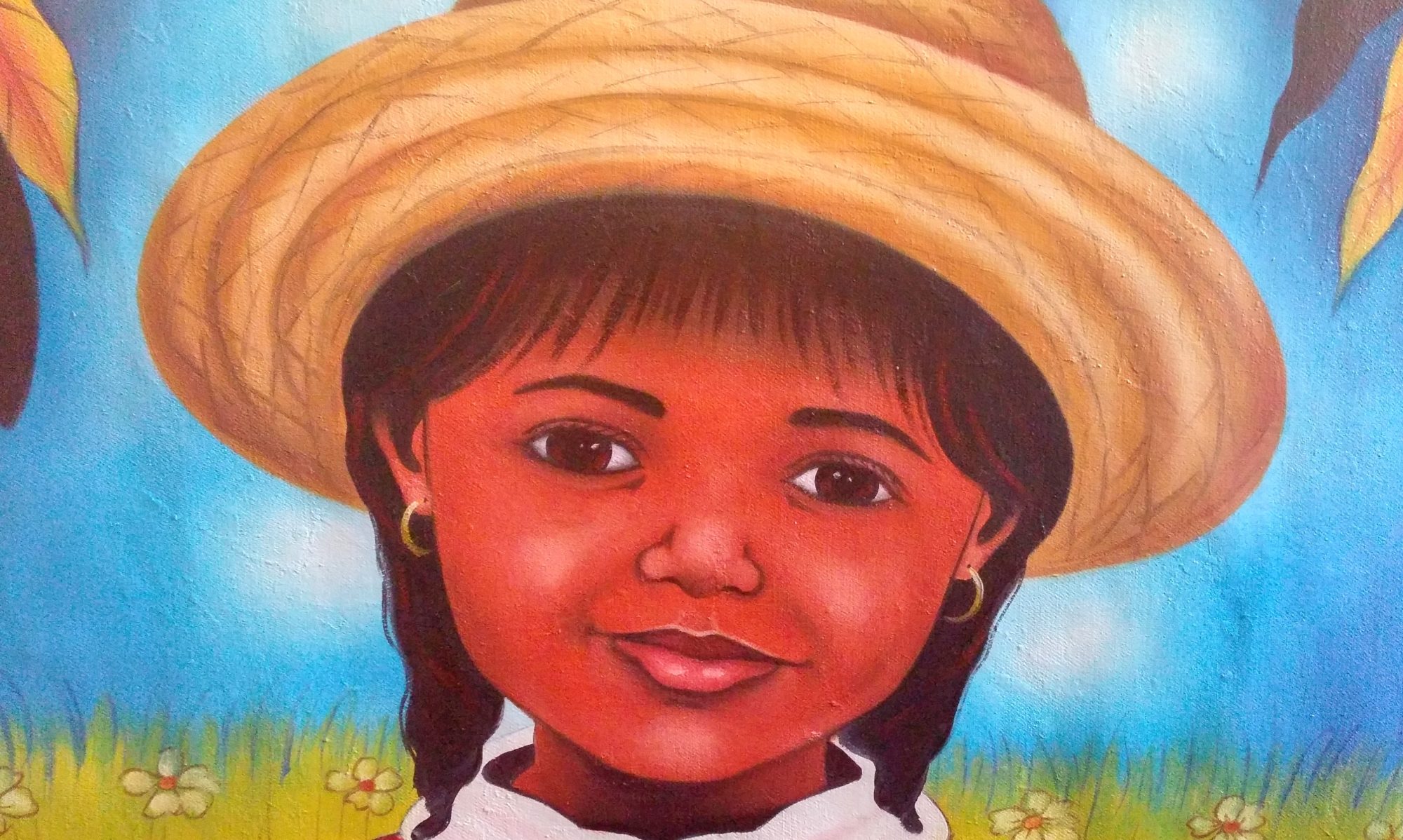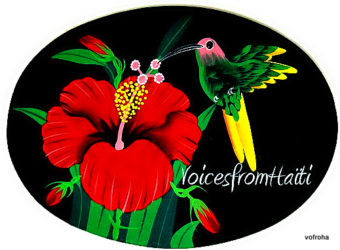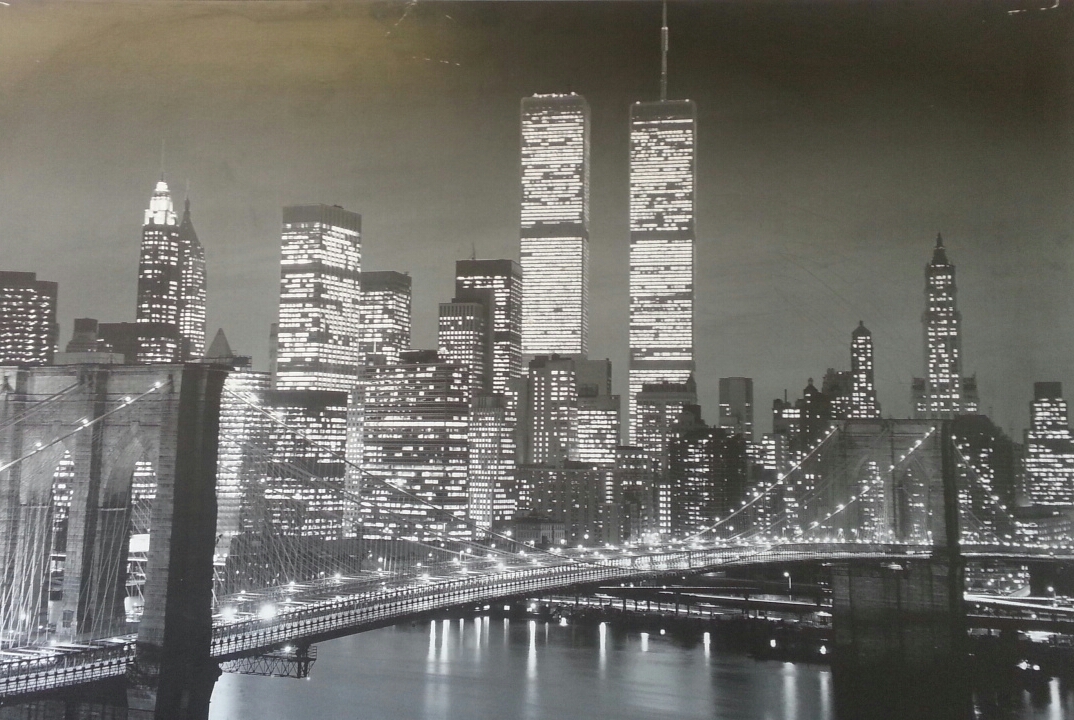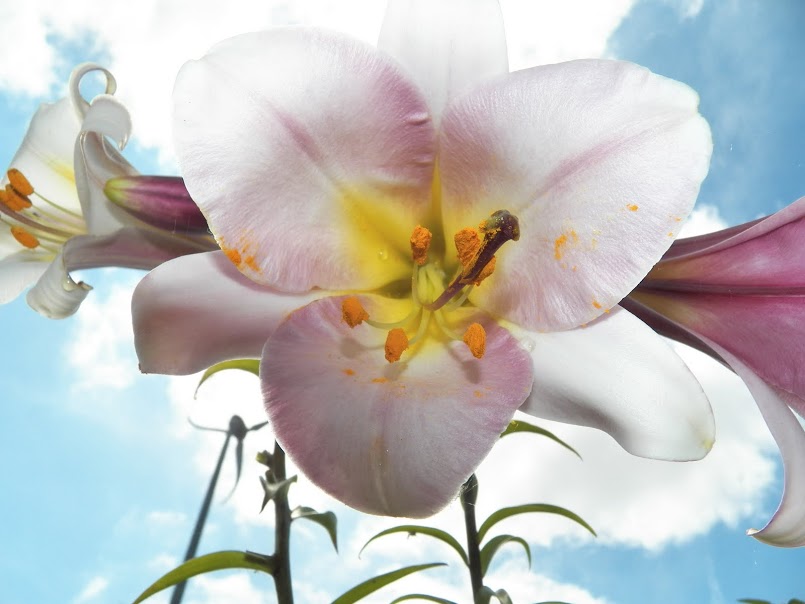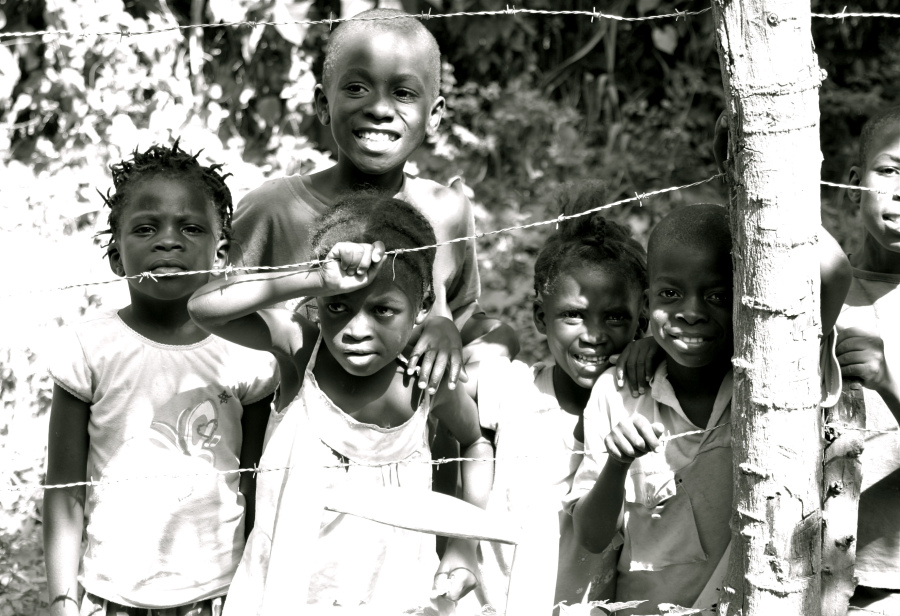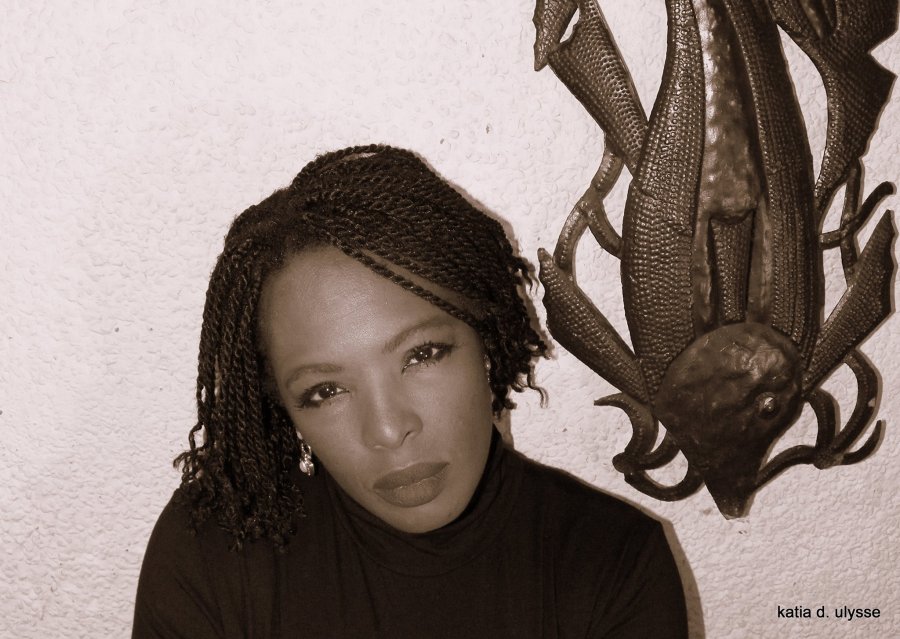It was one of those events that would forever change the way we tell time. In these post 9/11 years, not a day has gone by that we are not reminded of that hellish Tuesday morning. Our prayers remain with those who perished. Love , Light, Comfort, and Strength to the ones who lost their beloved. We remember.
Happy Birthday, Nennenn!
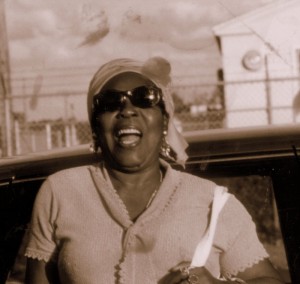 Lè w gen 90 zan, epi w kouche plat sou yon kabann lopital, pa gen anpil biznis ou ka regle. Ou etidye kat mi yo. Ou gade aparèy yo. Ou swiv doktè yo. Ak de je w fèmen, ou siveye dènye sa w kapab.
Lè w gen 90 zan, epi w kouche plat sou yon kabann lopital, pa gen anpil biznis ou ka regle. Ou etidye kat mi yo. Ou gade aparèy yo. Ou swiv doktè yo. Ak de je w fèmen, ou siveye dènye sa w kapab.
Respirasyon’w monte desann tankou chante Tim McGraw la ki rele Live Like You’re Dying (Viv tankou w pral mouri). Jounenjodiya wa p viv chante ya; se reyalite w. Tim McGraw pa bezwen di w respire kòmsi w prèt pou mouri. Se metye w.
Ou koute mezi ti chanjman nan rit aparèy yo. Ou souke tèt ou tou dousman. Si ou renmen jwe avèk vokabilè abcd, ou reyalize ke pi fò mo ou itilize sèjousi fini ak “y.” An Anglè “Y” gen menm son ak “Way”; men ou pa gen enterè gaspiye souf ou ap poze kesyon. Ou deja konprann ou pa p jwenn repons.
Ti moso fanmi w ki rete yo chita san konsolasyon. Yo chita tankou timoun grangou ka p rettann kras manje. Yo prèt pou yo endispoze. Dlo prèt pou kouri lan je yo. Yo pè gade malad la. Se kòd kè yo ap sote tankou timoun lan rekreyasyon!
Ti moso fanmi ou rete a kraponnen. Yo konnen byen se lan mòd stad sa yo moun konn jwe jwèt ki pi enpòtan an–chanpyona final la.
 Ay si you (ICU) konble ak moun malad ki vin fè konesans avèk lanmò. Pa gen yon kabann ki vid a midi, men demen maten wa jwenn menm senk ladan malad yo ki bat zèl yo. Chanm yo boure ak abuelitas, grand-papa, grandmè, ak dezoutwa <<M’te fout di w pinga w monte motosiklèt la.>>
Ay si you (ICU) konble ak moun malad ki vin fè konesans avèk lanmò. Pa gen yon kabann ki vid a midi, men demen maten wa jwenn menm senk ladan malad yo ki bat zèl yo. Chanm yo boure ak abuelitas, grand-papa, grandmè, ak dezoutwa <<M’te fout di w pinga w monte motosiklèt la.>>
Vizitè yo chita an plas, ou byen yo monte desann lan koulwa antiseptik la–tankou tòti ka p fè lago. Yo fè gwo diskisyon ak lonbraj yo. Anba yon silans ki lou sou zepòl you, yo mande poukisa? Pouki ou fè m sa? Yo rele way, manman, Anmwey. Woy, Bondye. Why?”
Yo lapriyè ak po je yo tankou bijou granmoun sere anba pil dra lan amwa. Menjan tou, pa gen yon moun ki ka wè kisa malad la ap siveye dèyè po je pa l.
Fanm tankou Felicie toujou gen yon ti souri pou yo bay le tout moun fin rele anmwey.
“Mezanmi, pa gen yon moun ki kwè ti madanm sa a gen katrevendizan tout bon vre,” yon enfimyè di.
“Eske se ou ki pitit fi malad la?” yon lòt enfimyè mande’m.
Chak enfimyè ki vini poze menm kesyon an: <<Eske ou se pitit fi’l? Ou sanble avè l tèt koupe.>>
Ou remèsye enfimyè yo. Ou pran prekosyon avè yo; ou trete yo tankou zanj lan syèl. Ou di yo mèsi senkantmil fwa.
Ou konnen malad la pa p mouri. Pa kounye a. Fanm tankou l se orijinal la. Se li ki vayan tout bon vre. Fanm sa yo gen tandans viv pou letènite. Se yo ki konn trase chemen. Yo toujou kite mak yo. Yo rete vivan, menmlè yo fin mouri.
Happy Birthday, Nennenn!
8/15/15
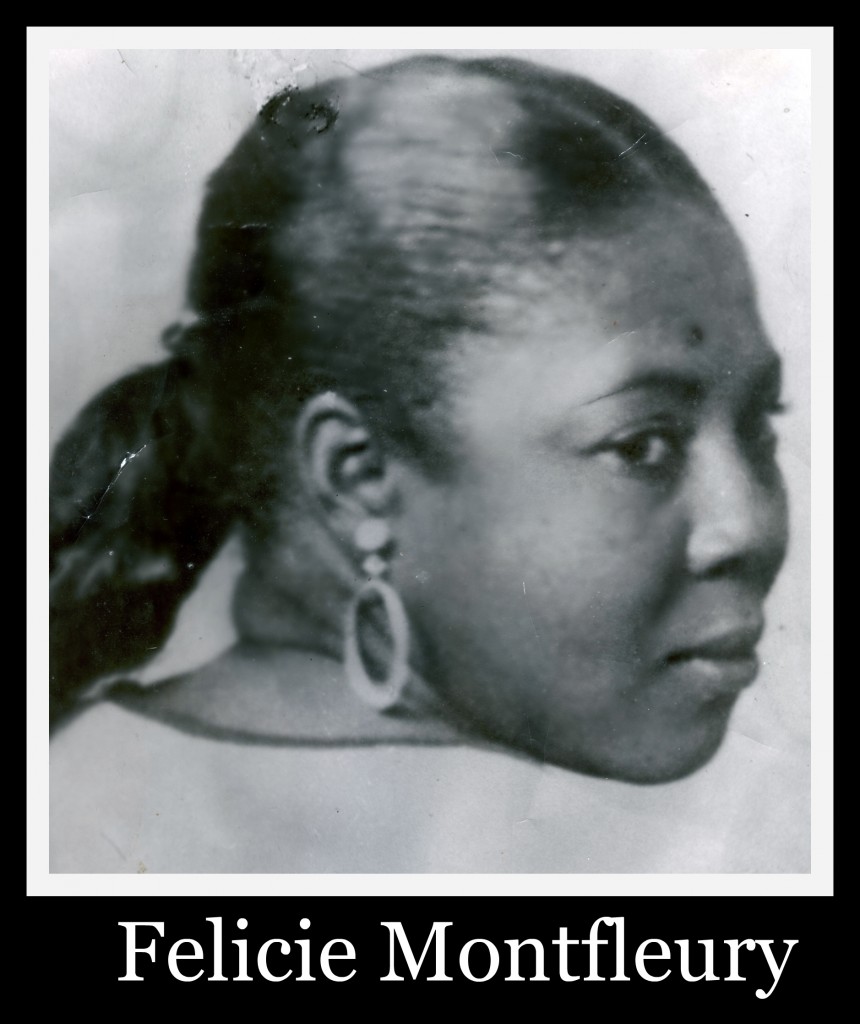 August 15, 1921 – April 2, 2012
August 15, 1921 – April 2, 2012
Why Haiti Needs New Narratives: New book by Gina A. Ulysse
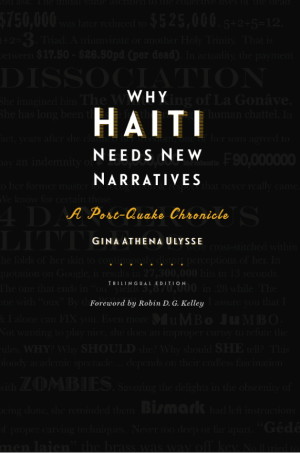 “Mainstream coverage of the catastrophic earthquake of January 12, 2010, reproduced longstanding stereotypes of Haiti. Aware that this Haiti is a rhetorically and graphically incarcerated one, the feminist anthropologist and performance artist Gina Athena Ulysse embarked on a writing spree that lasted over two years. Her trilingual book (English, Kreyòl, and French) contains thirty pieces and includes a foreword by award-winning author and historian Robin D. G. Kelley.” – From Brooklyn Public Library.
“Mainstream coverage of the catastrophic earthquake of January 12, 2010, reproduced longstanding stereotypes of Haiti. Aware that this Haiti is a rhetorically and graphically incarcerated one, the feminist anthropologist and performance artist Gina Athena Ulysse embarked on a writing spree that lasted over two years. Her trilingual book (English, Kreyòl, and French) contains thirty pieces and includes a foreword by award-winning author and historian Robin D. G. Kelley.” – From Brooklyn Public Library.
Gina A. Ulysse will read and discuss her work. Don’t miss it!
Why Haiti Needs New Narratives: A Post-Quake Chronicle
Central Library, Dweck Center
WHAT PEOPLE ARE SAYING ABOUT Ulysse’s new book: Why Haiti Needs New Narratives: A Post-Quake Chronicle
 “Ulysse’s clear, powerful writing rips through the stereotypes to reveal a portrait of Haiti in politics and art that will change the way you think about that nation’s culture, and your own.” (Jonathan M. Katz, author of The Big Truck That Went By: How the World Came to Save Haiti and Left Behind a Disaster)|
“Ulysse’s clear, powerful writing rips through the stereotypes to reveal a portrait of Haiti in politics and art that will change the way you think about that nation’s culture, and your own.” (Jonathan M. Katz, author of The Big Truck That Went By: How the World Came to Save Haiti and Left Behind a Disaster)|
“This is a beautifully written and profoundly important work of engaged anthropology. Gina Ulysse steps bravely into the public domain bringing a nuanced and sophisticated analysis of things Haitian to a large group of general readers as well as to a broad audience of scholars. Publication of this book marks a kind of ‘coming of age’ for anthropological bloggers and public anthropology.” (Paul Stoller, author of Yaya’s Story: The Quest for Well-Being in the World)
“This compilation is the gut-felt testimony of an insider/outsider that resounds like a thunderclap in the desert. Trapped in the alienating context of sterile academia, a neoliberal political economy, populations displaced, shock therapy and general geopolitical shifts, the author uses the gift of polysemy to open horizons. Through thought, action, word, poetry, song . . . flow yet-unbounded prospects.” (Rachel Beauvoir-Dominique, professor, Université d’État d’Haïti)
“Taking us through entangled and liberating possibilities, Gina Ulysse introduces us to Haiti, the kingdom of this world. Embedded in the interstices of words and of aesthetic sensibilities that summon the past into the present, the powerful promise of a people is revealed. Ashe.” (Arlene Torres, coeditor of Blackness in Latin America and the Caribbean)
“Five years after Haiti’s devastating earthquake, Gina Ulysse smashes clichés, defends Vodou, and reminds us of her homeland’s complex history. Her compelling as-it-happened reports and analyses are crucial to our understanding and empathy for the republic and its people.” (Katherine Spillar, executive editor, Ms. magazine)
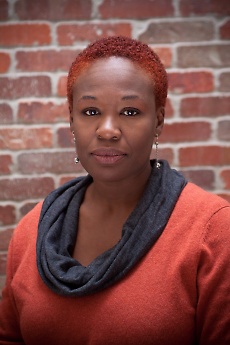 About the Author
About the Author
Gina Athena Ulysse was born in Pétion-Ville, Haiti. In 2005, when she became a U.S. citizen, she gave herself the name Athena. She is the middle child of three sisters – who had migrated to the East Coast of the United States in their early teens. Her family has lived somewhere around there ever since.
A feminist artist-anthropologist-activist and a self-proclaimed Post-Zora Interventionist, she earned her Ph.D. in anthropology from the University of Michigan in Ann Arbor. She is also a performance artist, poet and multi-media artist. It was during the early years of her graduate career that Ulysse began to seriously actively perform in part to pursue a childhood dream of wanting to be a singer and to ground herself and allow her creative spirit to breathe through this restructuring process that threatened to desensitize her.
Spokenword became her chosen medium. She deploys it to both explore and push the blurred border zones between ethnography and performance. She considers these works “alter(ed)native” forms of ethnography constructed out of what she calls “recycled ethnographic collectibles” (raw bits and pieces that seem too personal or trivial) through which she engages with the visceral that is embedded, yet too often absent, in structural analyses. Her ultimate aim with such works is to access/face and recreate a full and integrated subject without leaving the body behind. An interdisciplinary scholar-artist, Ulysse weaves history, statistics, personal narrative, theory, with Vodou chants to dramatize and address issues of social (in)justice, intersectional identities, spirituality and the dehumanization of Haitians and other marked bodies. With her performance work, she seeks to outline, confront and work through the continuities and discontinuities in the unprocessed horror of colonialism. Or to put it another way, Ulysse explores the complex ways the past functions in the present and is disavowed as both Michel-Rolph Trouillot and Sibylle Fischer have aptly put in Silencing the Past and Modernity Disavowed.
A dynamic performer, described by artist Evan Bissell as “a powerhouse and a whirling storm,” and historian Robin D.G. Kelley as “a one-woman aftershock” Ulysse has performed variations of her one-woman show Because When God is too Busy: Haiti, me and THE WORLD and other works at conferences, in colleges and universities throughout the United States and internationally.
She is currently developing an avant-garde meditation, VooDooDoll What if Haïti were a Woman: On ti Travay sou 21 Pwen or An Alter(ed)native in Something Other than Fiction. (10), the first installation-performance from this work, which was curated by Lucian Gomoll, had its debut at Encuentro in Montreal in 2014. Her latest project, Contemplating Distances – explores the exchange value of black bodies in the Transatlantic slave trade and the 18th century grain shortage in Saint Domingue – was presented at the “Spaces, Scales, and Routes: Region Formation in History and Anthropology conference.”
She is currently Professor of anthropology at Wesleyan University.
———————————————————-VoicesfromHaiti: Nou Bèl. Nou La! (We are Beautiful. We are Here!) Click HERE to purchase your own Nou Bèl. Nou La! T-shirt.
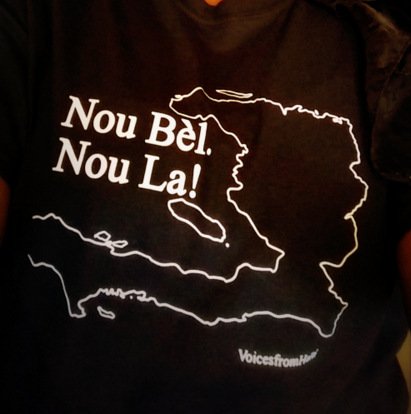
Get the T-shirt. Spread the message.
Haiti’s Long Lost Children
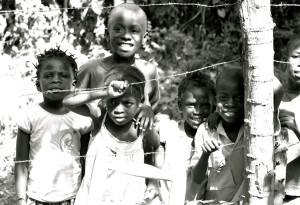 I look forward to a day when all of us can write different stories about Haiti. I may not see that day in my lifetime, I know. Perhaps my daughter will see a thriving Haiti–a Haiti that is respected; a Haiti that serves and benefits her people–not just those who use poverty as a tool to accomplish their covert agenda. Perhaps one day the enduring class line will loosen its knot a little. It is burdensome to know that 200,000 stateless Dominicans of Haitian origin will be tossed across the frontier. Many of them do not even speak the language. Many of them have never been to Haiti. I worry about how the country will receive the newcomers. Maybe Haiti will open her arms and create resources to aid her long-lost children. We’ll see.
I look forward to a day when all of us can write different stories about Haiti. I may not see that day in my lifetime, I know. Perhaps my daughter will see a thriving Haiti–a Haiti that is respected; a Haiti that serves and benefits her people–not just those who use poverty as a tool to accomplish their covert agenda. Perhaps one day the enduring class line will loosen its knot a little. It is burdensome to know that 200,000 stateless Dominicans of Haitian origin will be tossed across the frontier. Many of them do not even speak the language. Many of them have never been to Haiti. I worry about how the country will receive the newcomers. Maybe Haiti will open her arms and create resources to aid her long-lost children. We’ll see.
Tragedians, by Katia D. Ulysse
Poverty is like an engagement ring: expensive but obligatory. Necessary. The world would be bleak without it. Poverty gives birth to thriving institutions that are immune to failure. Poverty is a lottery with the largest payout in history. Poverty is exotic.
Poverty, like clean water, is indispensable. The engineers of this flourishing institution will kill to maintain its integrity. Tragedy brings shame and hopelessness to those under its crushing hooves. To others, it brings pleasure and conceit. Tragedy is an insatiable lover that rouses lust like dust in a storm, choking the air, clogging nostrils, and blinding eyes. Tragedy is irresistible.
Poverty dances on some tongues like bubbles in fine champagne. Poverty builds empires. Poverty drips like precious oils from silver spoons. Poverty is a magic wand. Sex, power, and fame are the crop poverty yields in abundance; however, when those ingredients come together, they form a potent and highly addictive drug. One hit and you’re hooked. You become a poverty-junky.
Poverty junkies need like-minded people. Junkies congregate in hemispheres of infinite supply. Good actors they are! Everyday they feign battles against hunger, homelessness, violence, disease. They ad lib and improvise with the internally displaced. They show death at its rawest. Children with distended bellies and flies around the mouth make excellent props. Tragedians win golden awards for their recurring roles in the never ending play.
Tragedians itch and salivate when they smell the kind of rain that causes houses to slide like molasses from above. The audience loves them.
“One hit and you’re hooked. You become a poverty-junky.”
Tragedians come from faraway places to act in this play. They fly in planes that look like gigantic vultures from afar. The minute tragedians complete the “Reason for Visiting Form,” something inside crawls out of a ditch, does handstands, back flips, figure eights, and all kinds of fancy tricks. No matter how grim and abysmal their prospects back home, by the time the plane lands on the blistering tarmac, they believe themselves so exceptional that they start to levitate.
One minute on the stage, and they are infused with the sort of boldness that makes one man swear he can carry a thousand on his head. They strut like peacocks. Starving audience members applaud them. After all, they sacrificed plenty to come perform here. Here.
Tragedians and their traveling theatre companies wear the same masks and costumes. They memorize the same scripts. The lead actors could be sets of twins; their understudies have the same twinkle in their eyes when it’s their turn in the spotlight. All of them are junkies in need of a fix. They scour the countryside, looking for dope. No other stage in the hemisphere satisfies their craving faster.
Everyday more actors arrive to star in the never-ending drama. They bring suitcases full of mosquito spray, tanning lotion, bathing-suits, secrets, joblessness, broken homes, broken loves, brokenness. They bring their broken selves; their ignored, back-home selves. The audience cheers and cries for encores. How splendid they look in their roles of savior, rescuer, knight in shining neon t-shirts!
“They bring their broken selves; their ignored, back-home selves. The audience cheers and cries for encores.”
Feed the hungry. Cure the people of their memories. Cure them of their drum rhythms. Fix them, for they are broken. Cure them of their beliefs. Rid them of that darkness in their hearts. Rescue them from their arid land and build hotels. Show them what is possible. Don’t bother explaining why they won’t be welcome in those hotels built on their own ancestral lands; they’ll see those buildings and understand that they don’t belong. The entire country is like a open air market; open for business twenty-four hours a day. It’s an all you can eat buffet.
Children treat Tragedians like canonized rock stars. Beggars beseech them as if they were patron saints. Please, please, throw your change down on us. Let your coins fall on our heads like hail in a storm.
Tragedians study their lines. They rehearse daily, even in their sleep. When a scene requires the sort of verbal acrobatics only a native can do, they hire one or two. Otherwise they don’t share the spotlight, lest they’re upstaged by some stagehand who wants to rewrite the script.
Tragedians fear stagehands. Although they don’t show it, they fear the audience even more. Poverty junkies live in constant fear of the supply running out. So, morning, noon, and night, they keep the audience spellbound. Enthralled. Enchanted. Entranced.
Tragedians improvise and ad lib without deviating from the proven plot. The show must never stop. The curtain must never fall on this greatest show on the cracked earth.
***
Katia D. Ulysse was born in Haiti, and moved to the United States as a teen. Her writings have been published in numerous literary journals, including the Caribbean Writer, Meridians,Calabash,Peregrine, and Smartish Pace, among others. Her work has also appeared inThe Butterfly’s Way and Haiti Noir. Her first children’s book, Fabiola Can Count, was published in 2013. Ulysse lives in Maryland with her husband and daughter. When she’s not reading, writing fiction, gardening, or teaching, she blogs on VoicesfromHaiti.com. Drifting is her first book of fiction.
